7 Gastric Sleeve Risks You May Not Know (Don’t miss #2)
Medically Reviewed by Katelyn J. Mock, US-Registered Dietician (R.D.)
Sleeve Gastrectomy is a more recent and popular procedure. It is restrictive in nature as it removes a larger portion of your stomach, reducing it to a vertical tube with a volume of 100ml or less. [1]“Bariatric Risks, Complications, and Side Effects” University of Pittsburgh Medical Centre (UPMC)View in Article
Alteration of bile acid metabolism is an important component of Gastric Sleeve, and represent a promising target in the management of metabolic disorders.[2]“Role of Bile Acids in Bariatric Surgery” Wenting Wang, Zhiqiang Chen. et.al. NCBI;
Front Physiol. 2019; 10: 374. Published online 2019 Apr 2
View in Article
How Is It Different From Gastric Bypass?
When all other weight loss measures aren’t potent, you have two surgical choices- Sleeve Gastrectomy and Gastric Bypass, both done laparoscopically.
- Gastric Sleeve is best for patients with BMI >/= 40.
- Removal of a larger part of the stomach results in lesser food holding capacity.
- The part of the stomach where ‘Ghrelin’ (the hunger hormone) is made is removed.
- Removal of this hunger hormone alters the hunger mechanism.
Just like other surgical procedures, the gastric sleeve has certain risks as well. However, the overall complication rates are low. The level of risks associated with this type of surgery is only up to 5%. [3]Sarkhosh K, Birch DW, Sharma A, Karmali S. Complications associated with laparoscopic sleeve gastrectomy for morbid obesity: a surgeon’s guide. Canadian Journal of Surgery
View in Article
The risks and complications of sleeve gastrectomy include:
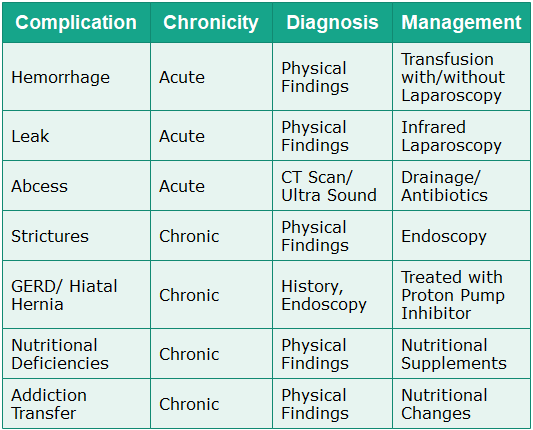
1. Internal Bleeding
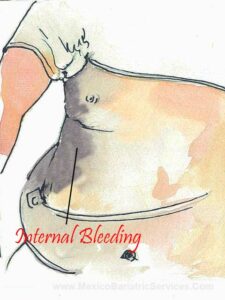 According to a study by Sarkhosh K. et al., there is up to 6% risk of internal bleeding or hemorrhage. [4]Sarkhosh K, Birch DW, Sharma A, Karmali S. Complications associated with laparoscopic sleeve gastrectomy for morbid obesity: a surgeon’s guide. Canadian Journal of Surgery
According to a study by Sarkhosh K. et al., there is up to 6% risk of internal bleeding or hemorrhage. [4]Sarkhosh K, Birch DW, Sharma A, Karmali S. Complications associated with laparoscopic sleeve gastrectomy for morbid obesity: a surgeon’s guide. Canadian Journal of Surgery
View in Article
Common areas can be gastric staple line, liver, spleen, or abdominal cavity walls.
Signs and Symptoms
- Weakness
- Light-headedness
- Shortness of breath
- Shock
- Low blood pressure
Prevention/Remedy
- Use of staples of an appropriate height or size
- Performing over-sewing of staple lines
- Sewing by hand
- Applying pressure before firing staples
- Staple line reinforcement is strengthening staple lines with bio-absorbable material.
- Hemostatic agents increase the coagulation properties of blood.
2. Pouch Stretching
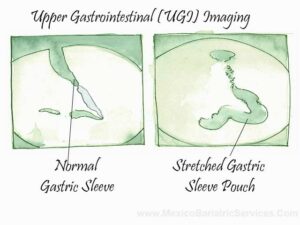 The stomach pouch starts to expand due to a gradual increase in the diet.
The stomach pouch starts to expand due to a gradual increase in the diet.
- Your stomach may grow close to its original size.
- The stretched pouch sends wrong hunger signals to the brain.
Signs and Symptoms
- Increased appetite
- Weight gain due to increased hunger
Prevention/Remedy
- A constant deviation from the ‘restricted portions’ of diet causes issues.
- Avoid fluids in between and right after meals causes additional pressure on the stomach, expanding it.
- Have Small snacks in between meals in case of hunger pangs.
Nutritionist’s Tip:
DO NOT drink soda after bariatric surgery.
3. Blister or Abscess
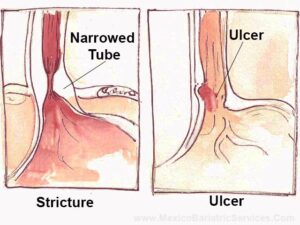 An abscess can form after bariatric procedures. It is a pocket of fluid. It develops internally in the abdominal or thoracic cavity. Bacteria infestation can cause infection and pain.
An abscess can form after bariatric procedures. It is a pocket of fluid. It develops internally in the abdominal or thoracic cavity. Bacteria infestation can cause infection and pain.
- According to Sarkhosh K. et al, there are roughly 0.7% chances of contracting an abscess or blister.[5]Sarkhosh K, Birch DW, Sharma A, Karmali S. Complications associated with laparoscopic sleeve gastrectomy for morbid obesity: a surgeon’s guide. Canadian Journal of Surgery.
View in Article - Abdominal pains, fever, and nausea are the main characteristics.
- It may even cause vomiting.
Signs and Symptoms
- Fever
- Redness and heat at the place of incision
- Increased heart rate
- Dizziness or light-headedness
Prevention/Remedy
- Antibiotics and thoracotomy are treatment options
- Surgically reaching the fluid pocket to drain the fluid followed by antibiotics is another option.
4. Gastric Sleeve Leakage
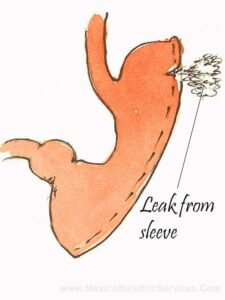 According to the report, Successful Management of a Gastric Sleeve Leak with an Endoscopic Stent, a Roux-en-Y bypass is riskier.
According to the report, Successful Management of a Gastric Sleeve Leak with an Endoscopic Stent, a Roux-en-Y bypass is riskier.
However, its complications may increase the morbidity and mortality rate. Gastric leak incidences vary from 0.7 to 20%.[6]Sarkhosh K, Birch DW, Sharma A, Karmali S. Complications associated with laparoscopic sleeve gastrectomy for morbid obesity: a surgeon’s guide. Canadian Journal of Surgery.
View in Article
- A gastric sleeve leak can delay the recovery.
- A leak can result in an infection, abscess, or blood clots in the lungs.
Signs and Symptoms
- Fever
- Increased heart rate
- Difficulty in breathing or altered breathing
Prevention/Remedy
- Enteral nutrition, a method of feeding a person through a tube.
- Proton-pump inhibitors provide prolonged gastric acid reduction.
- Proton pump inhibitors decrease potential harms caused by the leak.
- Placing a drain internally.
- Biological or bio-absorbable glues can be used to stop the leakage.
- Flexible surgery stents can be used to stop leaking.
5. Stricture
A stricture is a state in which the passage from or to the stomach gets blocked or inflamed. This causes all or some of the food NOT to enter the stomach or intestines. Strictures are common post-surgery.
- They can either be acute or chronic.
- It is a potential occurrence after LSG.
- It can cause food intolerance, vomiting, and nausea.
Signs and Symptoms
- Nausea or vomiting
- Difficulty in swallowing
- Intolerance to certain foods
Prevention/Remedy
A doctor will treat a stricture with the help of an endoscope. Special tools are attached to the top of this flexible tube with image sensors. A small inflatable balloon is joined to the tip to open or loosen the stricture. [7]Case Report on Successful Management of a Gastric Sleeve Leak with an Endoscopic Stent
View in Article
- Acid blockers prevent ulcer outgrowths and bleeding.
- It is advised to cut down on drinking alcohol and smoking.
- In rare cases, Revisionary surgery may be an option.
6. Undernourishment
Due to the reduced size of your stomach, many micronutrients do not get absorbed well.
- Nutritional deficiency is a common occurrence.
- Decreased diet and reduced nutrient absorption are the causes.
Signs and Symptoms
- Abnormally pale or yellowish skin
- Fatigue or lethargy
- Hair loss after bariatric surgery
- Light-headedness
- Constipation or constricted bowel movement
- Menstrual issues among women
- Lack of concentration
Prevention/Remedy
- Eat small meals throughout the day.
- Opt for foods that are dense in nutrients.
- Keep yourself hydrated.
- Ensure you get 60 grams of protein every day. Protein supplements like shakes or other instant meal mixes are a good option.
- Be regular with vitamins and minerals. Essential supplements are Calcium Citrate with Vitamin D, Vitamin B-12, and Iron.
Nutritionist’s Tips
- DO NOT take calcium and iron supplements at the same time.
- DO NOT eat fibrous foods with vitamins.
- DO NOT take vitamin supplements on an empty stomach.
7. Gastroesophageal Reflux Disease
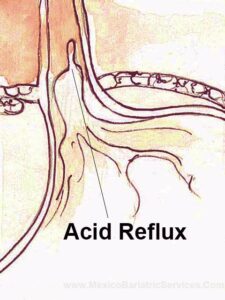 It is also called GERD, or heartburn. It is a digestive disorder of the stomach and esophagus. It causes the stomach’s contents and some acid to run back up to the esophagus.[5]Gastroesophageal Reflux Disease (GERD) – 2015; WebMD
It is also called GERD, or heartburn. It is a digestive disorder of the stomach and esophagus. It causes the stomach’s contents and some acid to run back up to the esophagus.[5]Gastroesophageal Reflux Disease (GERD) – 2015; WebMD
View in Article
- According to a WebMD report, Acid reflux is a prevalent condition among bariatric patients.
Signs and Symptoms
- Acid reflux to the esophagus
- Reflux of stomach contents to the throat
- A sore throat
- Swollen tonsils
- Difficulty in swallowing
- Heartburn
Prevention/Remedy
- Different medicines can be used to control GERD. These medicines relieve and prevent heartburn.
- Proton Pump Inhibitors inhibit the production of digestive acids.
- Antacids stop heartburn by neutralizing the acid in your system.
- Surgery strengthens barriers between the stomach and the esophagus.
- Endoscopic treatments strengthen the muscle and keep the content of the stomach from going into the esophagus.
- Lifestyle changes can do wonders.
An inspiring quote to help you in your weight loss journey.

References
- “Bariatric Risks, Complications and Side Effects” University of Pittsburgh Medical Centre (UPMC) [1]
- “Role of Bile Acids in Bariatric Surgery” Wenting Wang, Zhiqiang Chen. et al. NCBI;
Front Physiol. 2019; 10: 374. Published online 2019 Apr 2. doi: 10.3389/fphys.2019.00374 PMCID: PMC6454391 PMID: 31001146 [2]
- Sarkhosh K, Birch DW, Sharma A, Karmali S. Complications associated with laparoscopic sleeve gastrectomy for morbid obesity: a surgeon’s guide. Canadian Journal of Surgery. 2013;56(5):347-352. [3] [4] [5]
- Case Report on Successful Management of a Gastric Sleeve Leak with an Endoscopic Stent [6]
- Gastroesophageal Reflux Disease (GERD) – 2015; WebMD [7]
This Post Addresses
- Gastric sleeve problems symptoms
- Gastric sleeve long terms risks
- Vertical gastric sleeve post-op
- What are the long-term complications of gastric sleeve surgery?
- Gastric sleeve risk of death
- Is Gastric Bypass riskier than Gastric Sleeve?

